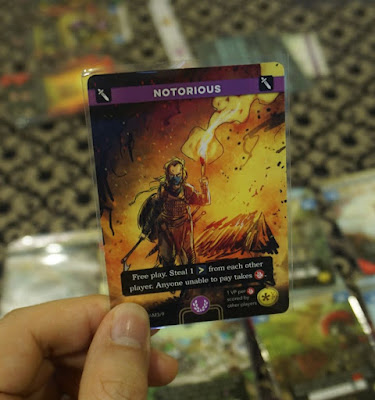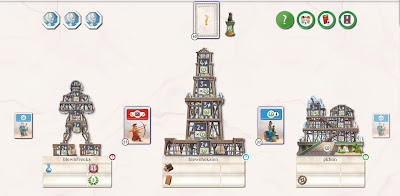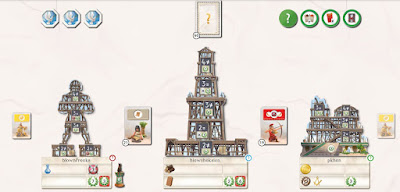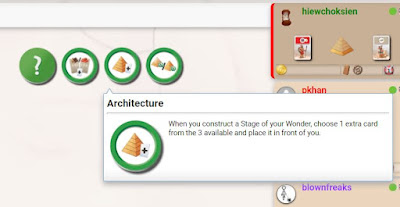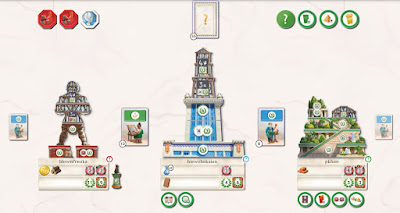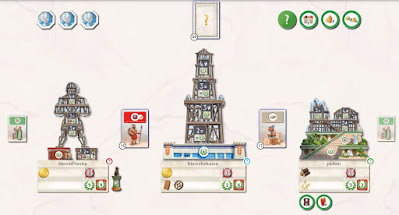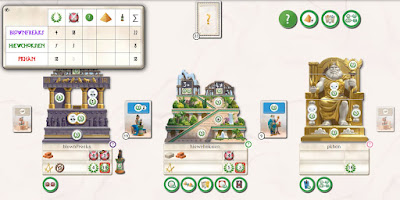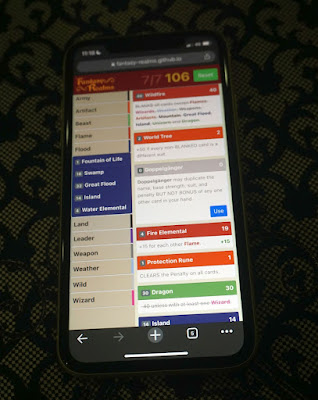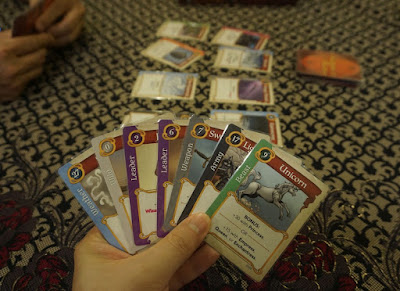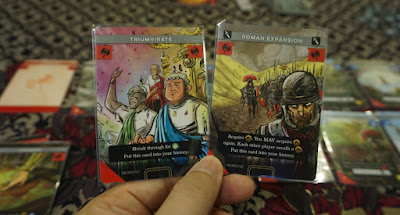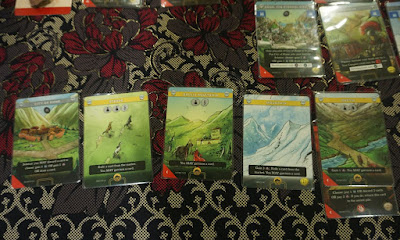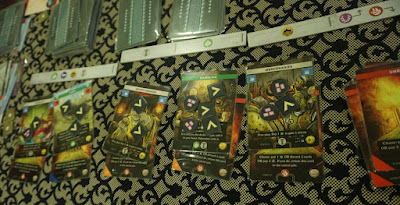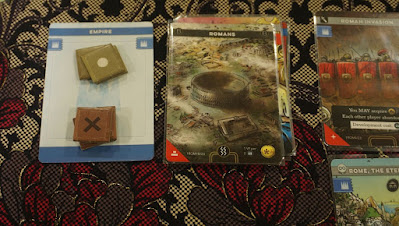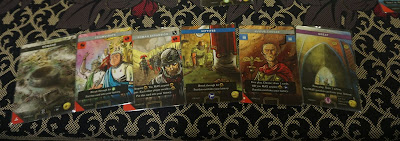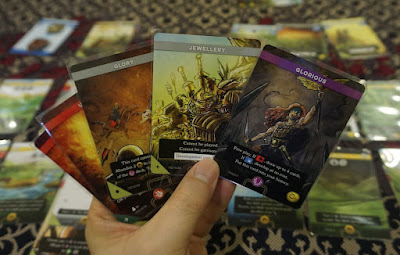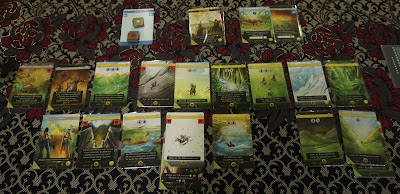I taught younger daughter Chen Rui Baseball Highlights
2045. She is not familiar with baseball, but neither am I. The game works even if you know little about the sport. I said to Chen Rui that this photo looks like a scene from a Japanese manga, when the main character is about to make a super combo move. Imagine a threatening sparkle next to her glasses.
We played the standard mode and not the beginner mode as recommended by the rulebook. In the standard mode you start with doing three rounds of buying players. In the beginner mode you have to play three matches in order to buy players three times. These three matches won't be interesting because there aren't many strong players yet. I don't have patience to watch kindergarten baseball.

In our game Chen Rui had one particular player who specialised in neutralising human players. My good players often got smacked down by this particular player. Eventually I had to adjust my buying strategy to get myself more robot players and cyborg players. Only then things got a little better for me. Each match we used 6 out of our deck of 15 cards. Considering that we could place one more card in the On Deck position, we had access to almost half our cards. When I had a good human player, chances are Chen Rui had her anti-human player ready to counter my human player, unless she had just used this player in the previous match and she hadn't reshuffled.
She was fond of one particular player called Boomer. She found the name funny. I wonder whether this is related to the "OK boomer" internet meme.
We don't use the marker provided for score keeping. We directly used the pawns which managed to get back to home base (horizontal row along the top in the photo above).
Chen Rui beat me by a huge margin in 7 Wonders
Duel, the 2-player-only version of 7 Wonders. She scored 69 points! She utilised well her wonders which had the "one more turn" ability. When I taught her the game I told her this was an important ability.
One of my biggest problem was I didn't have enough resource production cards - the brown and grey cards. I spent many turns discarding cards for cash, because I needed cash to pay for resources.
This particular dark purple guild card was very attractive. It would give us $9 and at least 9 points. Both of us had taken many red military cards throughout the game.
I tried to achieve a scientific victory by collecting green cards. I managed five different icons and was just short of one. My unbuilt wonder on the right would allow me to claim any discarded card, and I could get my 6th icon this way. Unfortunately for me Chen Rui quickly built the 6th and 7th wonders of the world, and that prevented me from building this wonder. I was so close! Had I not built my third wonder and instead saved the slot for this wonder, I would have won a scientific victory and Chen Rui would not have been able to stop me.
Since I invested much effort into the scientific victory, it was not surprising that I fell behind in other areas. The scientific victory was a gamble.
Chen Rui and I are still playing Attika. Now that we are getting very familiar with it, we can play quickly and we enjoy it even more. Sometimes when Chen Rui doesn't feel like learning new rules I'll suggest Attika.
In this particular game I (green) managed to win by connecting two temples. I placed the land tile at the bottom right and that allowed me to connect my buildings. It is always satisfying to pull off a connection victory, which is usually hard to do.
Chen Rui begged me not to do it but I said no. So she did a mini flip-the-table move, flipping over one of the land tiles. She was just throwing a mock tantrum. We immediately proceeded to a rematch.
Surprisingly our second game ended in a temple connection victory too. This time she (blue) made it. I was sloppy and didn't notice the threat. In this photo above you can see if she could construct three buildings at one go, she would connect the two temples.
Had I been more vigilant I would have been able to stop her. I was too smug from my previous victory, so I deserved this lesson in humility.
We played a third game. This time it had a more typical ending - all buildings being constructed. This was an aggressive match. Due to fighting for terrain, both of us had divided our buildings into two groups.
I (green) could go for a connection victory by linking up my two groups through the space on the right. However it was a long way so it wasn't hard for Chen Rui to stop me. Still, it was useful for me to be able to create a threat and force her to respond. She had to block me and in doing so her building construction was suboptimal. She had to create a third group of buildings, thus spending two more resource cards.
Eventually I won by constructing all my buildings. In this photo it looked like I (green) could still link up my buildings and win by connecting the two temples, but it was actually impossible because I didn't have enough buildings now.
In this particular game my wife Michelle joined us. Chen Rui (yellow) had a poor start at the bottom right. Michelle (red) had quickly expanded and walled her off. At this point Chen Rui had only one building on the board when Michelle and I had four or more.
Michelle (red) played aggressively, expanding quickly and grabbing land mercilessly. Because of this I spent many resource cards constructing buildings to stop her advances. I had to make suboptimal moves for the sake of defense, spending more cards than I wanted and forgoing the free construction bonuses.
I (green) placed a new tile in my backyard, and Chen Rui (yellow) swooped in to claim it for herself, blocking the way for my capital Korinth to grow. Bad girl!
I later took revenge by doing the same to a tile she placed in her backyard. Muahahaha revenge is always sweet. Well, I originally intended to build these three roads in my own backyard. Now that she had taken "my" land, I had to find some place else to build them.
The eventual winner was Chen Rui. She and Michelle were very close. Michelle could have won. When I saw her place her last land tile, I suggested a different location, because by doing so she could create a space for her to place her final building for free, next to another building it was dependent on. By doing this she could win in one turn instead of two. Her original plan was to spend one turn collecting resources, and then another to finish all buildings. My suggestion would let her win more quickly. However what we didn't expect was Chen Rui being able to block off that space which Michelle had just created for her own building. The tile placement helped Chen Rui instead, allowing her to build everything just before Michelle could. Michelle still needed two turns. Originally Chen Rui needed three, but due to that newly placed tile, she could do it in two, narrowly beating Michelle to win the game. Oops... my suggestion had cost Michelle the game. I swear I wasn't conspiring with Chen Rui. It was an impressive feat by Chen Rui, catching up and winning the game from a weak start.

I have been playing a lot of Race for the Galaxy on the iPad against AI's. In this particular game I had a very nice combo. I started with Rebel Cantina which allowed me to treat military worlds as civil worlds. I had Pan-Galactic Mediator which gave me a prestige (a more valuable victory point) whenever I used this ability to settle a military world. I later had Contact Specialist, which also gave me a treat-military-as-civil ability but an additional bonus is the settle cost is discounted by 1. Subsequently the Rebel Pact, Terraforming Engineers and Universal Peace Institute all gave me further discounts by a total of 5. I settled the 9-strength Rebel military world at a cost of only 3 cards!

Michelle felt like playing some games over the Chinese New Year holidays, and suggested Blokus. We played the 2-player version called Blokus Duo using my copy which is a standard 4-player version. To play the 2-player version we restricted play to a smaller area. Also our first pieces had to be played on two specific starting squares instead of corner squares in the standard 4-player game.

Blokus is a game with straightforward rules. You aim to play as many of your pieces as possible. To play a piece, its corner must touch the corner of one of your other pieces, and its edges must not touch the edges of any of your other pieces. The game ends when no one is able to play any more pieces. Whoever has the fewest squares in their leftover pieces wins. That's all there is. Yet this is a game that let me experience a few stages of learning. At first I thought it was all about blocking others. Even the name said so - block us. Later I realised that being collaborative might actually work better. It was more important to ensure you could spread out and reach more areas, utilising spaces which your opponent couldn't use anyway. As I played more, I came back to realise that in the end you still need to block others cleverly, while most of the time going with the flow of your opponents and playing many complementing pieces. This is the kind of game in which you can philosophise, but you can also play it in a relaxed manner without thinking too much.

I have been playing Pandemic Legacy: Season 0 with my family, and since it is set during the Cold War, it made me boot up Twilight Struggle on the iPad to play against the AI. I played USSR. In this particular game our competition over Pakistan was intense, with influence level going beyond 10!
I noticed that the AI seemed to be breaking a rule. When it did coups, the DEFCON level didn't worsen. I always watched the DEFCON level closely to make sure I didn't trigger a thermonuclear war and lose. The AI seemed to enjoy starting coups all over the place, not worrying about the DEFCON. I later realised that I had misunderstood the coup rules. Coups only affect DEFCON if they were done at battleground countries. I had thought they always affected DEFCON. So no, the AI wasn't cheating.
The AI in Twilight Struggle isn't very strong. It is sufficient for you to learn the game but once you know the game well enough it doesn't pose much challenge. However I still chose to play against it because I was only looking to play a relaxed game.
I was rusty. I only managed to win when the game ended after Turn 10. I remember I used to win by sudden death when I reached 20VP. Not that this is something to be proud of, since the AI is weak. The overall app is done very well. Very practical and easy to use for such a complex game.
